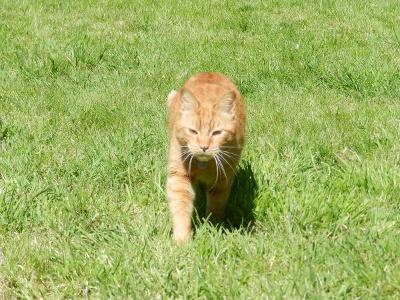
 Ever wondered why dolphins jump out of the water, why cats knead or why bats sleep upside down? Well look no further as we have tackled some of the most common and slightly obscure questions about your favorite animal species to give you the answers you have been looking for!
Ever wondered why dolphins jump out of the water, why cats knead or why bats sleep upside down? Well look no further as we have tackled some of the most common and slightly obscure questions about your favorite animal species to give you the answers you have been looking for!Why do giraffes have black tongues? A giraffes tongue (which is up to 21 inches in length) is thought to be black in color to protect it from sunburn. Giraffes spend a large part of their day feeding in the hot African sun and it is thought that without the dark colouration, their tongues would be easily burnt!
Why do fish have scales? The scales of fish are bony in structure and overlap one another to cover the whole body. These scales provide much needed protection for their soft bodies whilst also allowing them to move freely through the water! Amazingly, the rings on the scales of fish also actually indicate their age!
Why do monkeys groom each other? At first glance you would easily think that monkeys groom one another in order to remove dirt and parasites from their skin and fur, however, despite this being an important part of grooming, it actually strengthens the relationship between individuals as it allows them to bond closely with one another.
Why do ants live in colonies? Unlike some animal species who live only for themselves, ants live together in large groups where each member has a very specific job that contributes to the success of the group as a whole. Depending on the species, ant colonies can contain millions of ants all with their own role that helps to strengthen and ensure the stability of the group.
Why do cats knead? When cats are young kittens, kneading is an important part of stimulating the milk flow from their mother. As they grow older, cats knead when they are happy and content as it is thought to be very comforting for them. It is also thought that it could be important in marking territory as they have scent glands on their paws.
Why do hippos have pink sweat? Although hippos don't actually have sweat glands, they are known to secrete a red-coloured substance from special glands in their skin. Unlike other mammals who sweat primarily to cool the skin down, the fluid secreted on the skin of hippos acts more as a moisturiser as well as protecting them from prolonged exposure to water and being an antibiotic to protect them from infection.
Why do raccoons wash their food? Raccoons don't actually wash their food as a matter of hygiene but instead repeatedly roll and dip items into water (when close to it) before consuming it. This is thought to be because their hands are so sensitive, their sense is greatly heightened when stimulated by water therefore allowing them to take in more information about what they are about to eat.
Why do snakes have forked tongues? Reptiles smell using their tongues, and snakes are no different. When they flick their tongue out, the two prongs spread as far as they can collecting chemicals and pheromones from the surrounding air. These are then processed after the tongue flicks back into their mouths allowing them to sense what is going on around them.
Why do dolphins jump? Well it seems for multiple reasons including: Jumping through the air consumes less energy than swimming; It provides entertainment and ensures that their senses remain sharp; Any parasites that have been collected on their bodies in the water are dispersed, and, it allows them to communicate with members of their own pod and those from others.
Why do bats sleep upside down? Besides the fact that they are very well protected from predators when hanging aloft, bats are actually unable to take off in flight from a still up-right position as their wings simply cannot generate sufficient lift. Therefore by hanging upside down they are in the optimum position to take off in flight.

